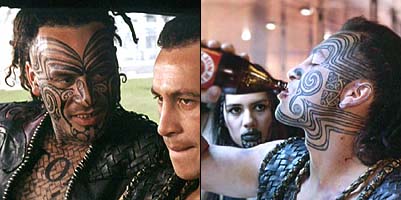Once Were Warriors
New Zealand movie featuring tattooed Maori
Lee Tamahori's powerful 1994 film tells the story of the Heke family, and the domestic violence that follows them. The cast is predominately Maori, many of whom wear Moko (though probably not culturally appropriate, nor whanau/hapu sanctioned in the movie's context). The moko are, of course, done with make up and not real.
Most of the moko featured were designed by Maori tattooist Mike E. who now owns and operates Unique Tattoos in Subiaco, Western Australia. Inia Taylor, a ta moko artist from Aotearoa New Zealand, has claimed that he designed and applied the moko featured in Once Were Warriors. This was claimed on a television show called The Living Room (directed by Nathan Morris).
This was followed by the poorly received sequel "What Becomes of the Broken Hearted?" in 1999.
With or without the body art content, this film is a must see.
Once Were Warriors caused an uproar in New Zealand when it was first released for its depiction of domestic abuse (both mental and physical), rape, drug use, and alcoholism. Many saw it as an accurate depiction of what was occuring in low socio-economic neighbourhoods across NZ, though arguably this is no longer the case.
It exposed an ugly undercurrent of violence and alcoholism which many Maori lived with and forced a lot of people to re-evaluate what was occurring within Maoridom.
The movie was massively successful in New Zealand, and became a cult hit in North America, especially among the tattooed— it is probably single handedly responsible for the dramatic increase in popularity of Kirituhi and Maori-inspired tattooing. It is deeply moving on many levels.
ISBN: B0000A02Y4 (Find this at Amazon.com)
External Links
